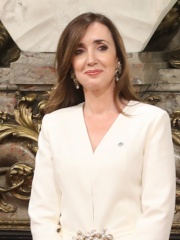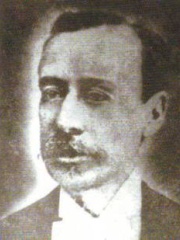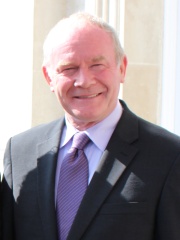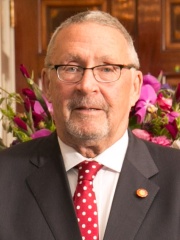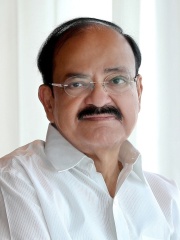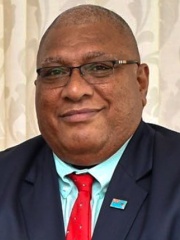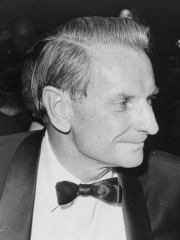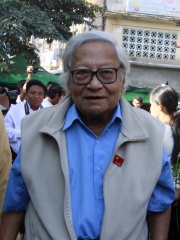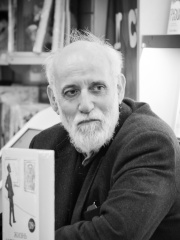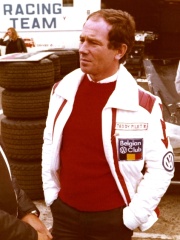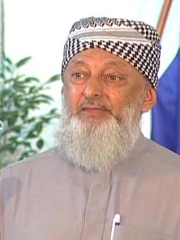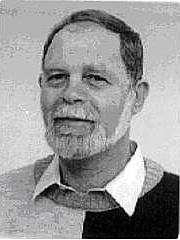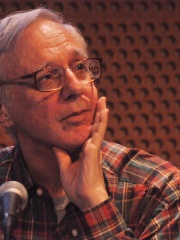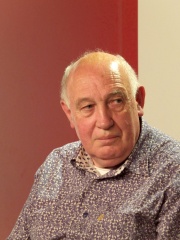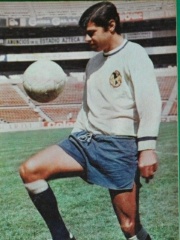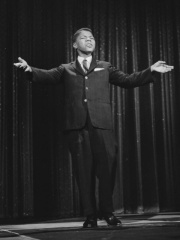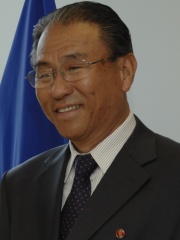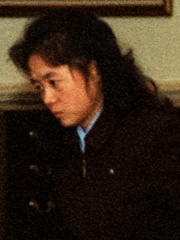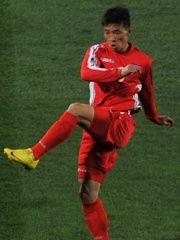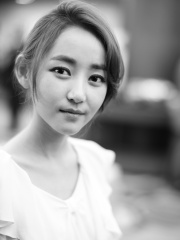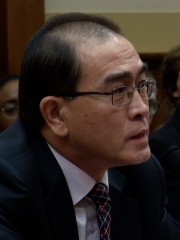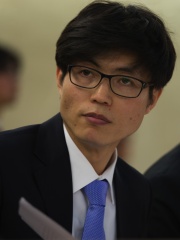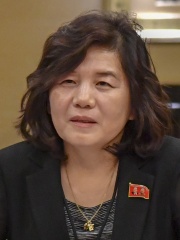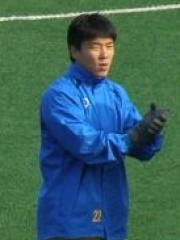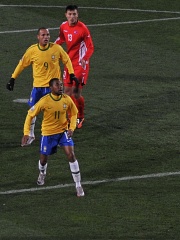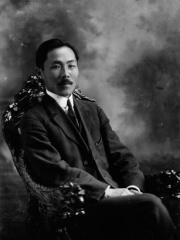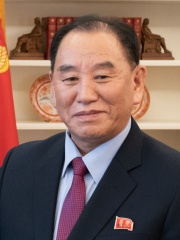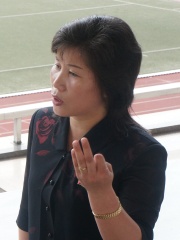Politician
Han Pil-hwa
1942 - today
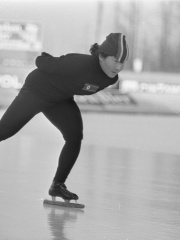
 Han Pil-hwa
Han Pil-hwa
Han Pil-hwa (Korean: 한필화; Hancha: 韓弼花; born 21 January 1942) is a female North Korean speed skater who competed in the 1964 Winter Olympics and in the 1972 Winter Olympics. She was the first woman to represent North Korea at the Olympics. She was born in Nampo, South Pyongan Province. Read more on Wikipedia
Her biography is available in 16 different languages on Wikipedia. Han Pil-hwa is the 15,679th most popular politician (down from 15,676th in 2024), the 120th most popular biography from North Korea (down from 111th in 2019) and the 81st most popular North Korean Politician.
Memorability Metrics
Page views of Han Pil-hwa by language
Among Politicians
Among politicians, Han Pil-hwa ranks 15,679 out of 19,576. Before her are Publius Cornelius Scipio Asina, Victoria Villarruel, Rafael Zaldívar, Hussa of Bernicia, Martin McGuinness, and Baba-aha-iddina. After her are Bridei VII, Guy Scott, Venkaiah Naidu, Wiliame Katonivere, Laurance Rockefeller, and Win Tin.
Most Popular Politicians in Wikipedia
Go to all RankingsPublius Cornelius Scipio Asina
300 BC - Present
HPI: 54.57
Rank: 15,680
Victoria Villarruel
1975 - Present
HPI: 54.57
Rank: 15,681
Rafael Zaldívar
1834 - 1903
HPI: 54.57
Rank: 15,682
Hussa of Bernicia
600 - 593
HPI: 54.57
Rank: 15,683
Martin McGuinness
1950 - 2017
HPI: 54.56
Rank: 15,684
Baba-aha-iddina
900 BC - 900 BC
HPI: 54.56
Rank: 15,685
Han Pil-hwa
1942 - Present
HPI: 54.56
Rank: 15,686
Bridei VII
HPI: 54.56
Rank: 15,687
Guy Scott
1944 - Present
HPI: 54.56
Rank: 15,688
Venkaiah Naidu
1949 - Present
HPI: 54.56
Rank: 15,689
Wiliame Katonivere
1964 - Present
HPI: 54.56
Rank: 15,690
Laurance Rockefeller
1910 - 2004
HPI: 54.56
Rank: 15,691
Win Tin
1929 - 2014
HPI: 54.55
Rank: 15,692
Contemporaries
Among people born in 1942, Han Pil-hwa ranks 534. Before her are Donald Rayfield, Jo Vonlanthen, Michael Nesmith, Teddy Pilette, Imran N. Hosein, and Rudolf Belin. After her are Gideon Toury, Robert Christgau, Raymond Depardon, Javier Fragoso, Frankie Lymon, and Michael Giles.
Others Born in 1942
Go to all RankingsDonald Rayfield
WRITER
1942 - Present
HPI: 54.65
Rank: 528
Jo Vonlanthen
RACING DRIVER
1942 - Present
HPI: 54.64
Rank: 529
Michael Nesmith
MUSICIAN
1942 - 2021
HPI: 54.63
Rank: 530
Teddy Pilette
RACING DRIVER
1942 - Present
HPI: 54.60
Rank: 531
Imran N. Hosein
PHILOSOPHER
1942 - Present
HPI: 54.58
Rank: 532
Rudolf Belin
SOCCER PLAYER
1942 - 2025
HPI: 54.57
Rank: 533
Han Pil-hwa
POLITICIAN
1942 - Present
HPI: 54.56
Rank: 534
Gideon Toury
LINGUIST
1942 - 2016
HPI: 54.54
Rank: 535
Robert Christgau
WRITER
1942 - Present
HPI: 54.51
Rank: 536
Raymond Depardon
FILM DIRECTOR
1942 - Present
HPI: 54.51
Rank: 537
Javier Fragoso
SOCCER PLAYER
1942 - 2014
HPI: 54.49
Rank: 538
Frankie Lymon
SINGER
1942 - 1968
HPI: 54.49
Rank: 539
Michael Giles
MUSICIAN
1942 - Present
HPI: 54.48
Rank: 540
In North Korea
Among people born in North Korea, Han Pil-hwa ranks 123 out of 162. Before her are Chang Sang (1939), Pak Ui-chun (1932), Li Chan-myung (1947), Kim Ok (1964), Ji Yun-nam (1976), and Park Yeon-mi (1993). After her are Thae Yong-ho (1962), Shin Dong-hyuk (1982), Choe Son-hui (1964), Hong Yong-jo (1982), Li Bun-hui (1968), and Ri Myong-guk (1986).
Others born in North Korea
Go to all RankingsChang Sang
POLITICIAN
1939 - Present
HPI: 56.26
Rank: 117
Pak Ui-chun
POLITICIAN
1932 - Present
HPI: 56.24
Rank: 118
Li Chan-myung
SOCCER PLAYER
1947 - Present
HPI: 56.20
Rank: 119
Kim Ok
SOCIAL ACTIVIST
1964 - Present
HPI: 55.88
Rank: 120
Ji Yun-nam
SOCCER PLAYER
1976 - Present
HPI: 55.65
Rank: 121
Park Yeon-mi
WRITER
1993 - Present
HPI: 54.79
Rank: 122
Han Pil-hwa
POLITICIAN
1942 - Present
HPI: 54.56
Rank: 123
Thae Yong-ho
POLITICIAN
1962 - Present
HPI: 52.92
Rank: 124
Shin Dong-hyuk
SOCIAL ACTIVIST
1982 - Present
HPI: 52.52
Rank: 125
Choe Son-hui
POLITICIAN
1964 - Present
HPI: 52.02
Rank: 126
Hong Yong-jo
SOCCER PLAYER
1982 - Present
HPI: 51.87
Rank: 127
Li Bun-hui
TABLE TENNIS PLAYER
1968 - Present
HPI: 49.94
Rank: 128
Ri Myong-guk
SOCCER PLAYER
1986 - Present
HPI: 49.79
Rank: 129
Among Politicians In North Korea
Among politicians born in North Korea, Han Pil-hwa ranks 81. Before her are Ahn Changho (1876), Kim Sol-song (1974), Choe Thae-bok (1930), Kim Yong-chol (1946), Chang Sang (1939), and Pak Ui-chun (1932). After her are Thae Yong-ho (1962), Choe Son-hui (1964), An Kum-ae (1980), Jong Song-ok (1974), Won Ok-im (1986), and O Jong-ae (1984).
Ahn Changho
1876 - 1938
HPI: 58.06
Rank: 75
Kim Sol-song
1974 - Present
HPI: 57.51
Rank: 76
Choe Thae-bok
1930 - 2024
HPI: 57.10
Rank: 77
Kim Yong-chol
1946 - Present
HPI: 56.70
Rank: 78
Chang Sang
1939 - Present
HPI: 56.26
Rank: 79
Pak Ui-chun
1932 - Present
HPI: 56.24
Rank: 80
Han Pil-hwa
1942 - Present
HPI: 54.56
Rank: 81
Thae Yong-ho
1962 - Present
HPI: 52.92
Rank: 82
Choe Son-hui
1964 - Present
HPI: 52.02
Rank: 83
An Kum-ae
1980 - Present
HPI: 49.45
Rank: 84
Jong Song-ok
1974 - Present
HPI: 44.50
Rank: 85
Won Ok-im
1986 - Present
HPI: 41.12
Rank: 86
O Jong-ae
1984 - Present
HPI: 36.65
Rank: 87

